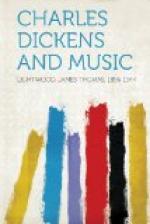Then there was a fight, when the ‘New Police’ came up and ‘hiked’ them off before the magistrate. There is a satisfactory ending, and ‘Bill got fin’d.’ Here is a reminder that we are indebted to Mr. Martin, M.P., for initiating the movement which resulted in the ’Royal Society for the Prevention of Cruelty to Animals’ being established in 1824. Two years previously Parliament had passed what is known as Martin’s Act (1822), which was the first step taken by this or any other country for the protection of animals. In Scene 7 of Sketches by Boz there is a mention of ’the renowned Mr. Martin, of costermonger notoriety.’ The reference to the New Police Act reminds us that the London police force was remodelled by Mr. (afterwards Sir Robert) Peel in 1829. Hence the date of the song will be within a year or two of this.
Mr. Reginald Wilfer (O.M.F.) owed his nickname to the conventional chorus of some of the comic songs of the period. Being a modest man, he felt unable to live up to the grandeur of his Christian name, so he always signed himself ‘R. Wilfer.’ Hence his neighbours provided him with all sorts of fancy names beginning with R, but his popular name was Rumty, which a ’gentleman of convivial habits connected with the drug market’ had bestowed upon him, and which was derived from the burden—
Rumty iddity, row dow dow,
Sing toodlely teedlely, bow
wow wow.
The third decade of the nineteenth century saw the coming of the Christy Minstrels. One of the earliest of the so-called ‘negro’ impersonators was T.D. Rice, whose song ‘Jim Crow’ (A.N.) took England by storm. It is useless to attempt to account for the remarkable popularity of this and many another favourite, but the fact remains that the song sold by thousands. In this case it may have been due to the extraordinary antics of the singer, for the words certainly do not carry weight (see p. 146).
Rice made his first appearance at the Surrey Theatre in 1836, when he played in a sketch entitled Bone Squash Diabolo, in which he took the part of ‘Jim Crow.’ The song soon went all over England, and ‘Jim Crow’ hats and pipes were all the rage, while Punch caricatured a statesman who changed his opinions on some question of the day as the political ‘Jim Crow.’ To this class also belongs the song ‘Buffalo Gals’ (see p. 10).
Amongst the contents of the shop window at the watering-place referred to in Out of the Season was
every polka with a coloured frontispiece that ever was published; from the original one, where a smooth male or female Pole of high rank are coming at the observer with their arms akimbo, to the ‘Ratcatcher’s Daughter.’
This last piece is of some slight interest from the fact that certain people have claimed that the hymn-tune ‘Belmont’ is derived therefrom. We give the first four lines, and leave our readers to draw their own conclusions. It is worth while stating that the first appearance of the hymn-tune took place soon after the song became popular.[17]




